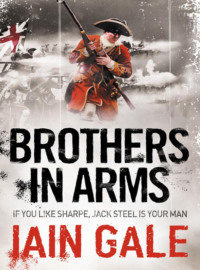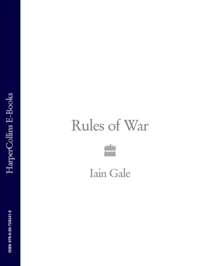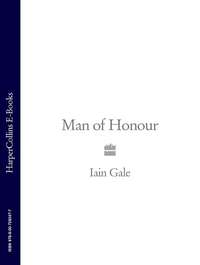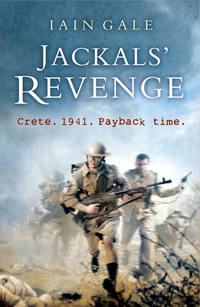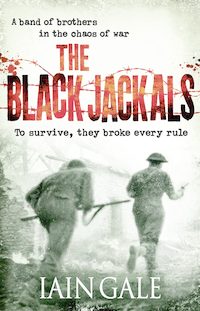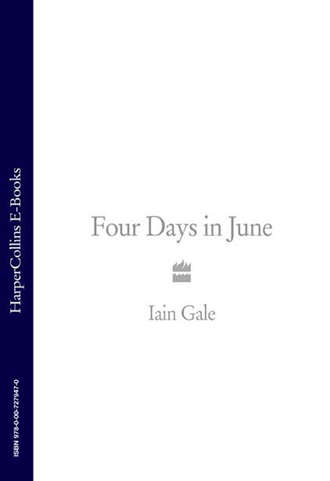
Полная версия
Four Days in June
He stood up slowly, straightened his shako and turned to Biddle, who was hovering, alert, close by. ‘What’s our strength, Colour Sar’nt?’
‘This morning, sir, one hundred and ninety-three men, sir, all told. Including that is yourself, sir, and the two colonels, Captain Moore, Captain Evelyn, Captain Elrington and the ensigns, sir – Mister Gooch and Mister Standen.’
In normal circumstances Macdonell’s command – No. 1 Company – consisted only of his own junior officers, Tom Sowerby and John Montagu, ten NCOs and some 100 guardsmen. Ten such companies formed the battalion – Second Battalion, 2nd Coldstream Guards, under Colonel Alexander Woodford. For the last year, however, while the battalion had been stationed here in the Low Countries, Macdonell had been its temporary commanding officer. It was perhaps on account of this responsibility, he supposed, together with his impressive service record, that he now found himself, for the duration of the campaign at least, moved to command of the battalion’s Light Company. And more than this, to the command too of the Light Company of the 3rd Scots Guards, who drew their recruits primarily from his native country. In all, nearly 200 men.
Good to be leading Scots again in what he believed would be the final conflict of these long and bloody wars. Of course they were not, most of them, Highlanders like him. Many originated from Edinburgh and Glasgow. A few were borderers. There were some, though, whom he knew to understand the old tongue. MacGregor, for instance – that big sergeant-major of the 3rd Guards, with the huge grin and hands like spades. Macdonell closed his eyes, and, leaning back against the hedge, attempted to catch a few moments’ rest. Good to lead Scots again. Back where he had started. Full circle.
SIX
Quatre-Bras, 11 a.m. De Lancey
He took a sip of coffee and winced. The brew, which he had accepted gratefully from George Scovell and of whose origins he had thought it best not to enquire, was stronger than that to which he was accustomed and uncommonly bitter. Still, it was fulfilling its purpose. Twice in the last hour he had felt his eyes begin to close. The strain of the previous evening and a profound lack of sleep were starting to tell. It had been 7 a.m. before he had despatched Magdalene, her groom and maid, to Antwerp. He was content at least with her safety, having already made provision for her to be cared for there by Captain Mitchell of the 25th, the Deputy Assistant Quartermaster General to the city. He took another sip of the thick brown liquid and rolled it around in his mouth. He knew of old, from so many mornings in the Peninsula, similarly heavy-lidded under a Spanish sun, that if only he could keep awake until midday he would be able to function till nightfall.
De Lancey had left Brussels at 8 that morning, reaching the Quatre-Bras farm close on 10 o’clock. He and Wellington had ridden hard down the main road from Brussels, their advance party composed only of Somerset, Müffling and a half-troop escort of Life Guards. The remainder of the Duke’s staff – some forty officers, including their friend d’Alava, had followed close behind. They had been greeted by a suitably aggressive picket of green-coated Nassauers, Prince Bernhard of Saxe-Weimar, his superior General Perponcher and the Prince of Orange, all still jubilant at having held off what purported to be a sizeable French force. Of that force, however, there was as yet little immediate evidence. In fact Saxe-Weimar and Perponcher had gone against Wellington’s express directive to collect on Nivelles. Securing the authority of the Prince of Orange’s Chief of Staff, the enigmatic and talented General Constant-Rebecque, and in the knowledge that they might be hopelessly outnumbered, they had decided to stand at the crossroads. Naturally the Peer had not thought it politic to mention the fact this morning. For it was just possible, thought De Lancey with wry amusement, that Rebecque’s direct disobedience of an order from the greatest military mind on Earth might have saved the entire campaign.
De Lancey sat astride his horse at the centre of the highest point of what would be, when the army finally arrived, the Allied line. Following Wellington’s example he was clad in a dark blue civilian top-coat, rather than the regulation red tunic. What need had either man for show? Wellington might wear red and gold for parades at the Horse Guards, but in battle he preferred the plain clothes which told his men that here was a man of sober mind and quiet sensibility. The sort of man whom they knew they could trust to win a battle.
Like Wellington too, and the entire General Staff, De Lancey wore a simple black bicorn hat, fore and aft. He had also, since the last years of the Peninsular campaign, taken to imitating Wellington’s habit of strapping a change of clothes to the back of his saddle, and, in place of a pistol holster, a pen and paper, with the addition of a bulging map case and a deep morocco leather document wallet. He reached into it now, pulled out a small field telescope and brought it to his eye.
This was good ground. He was aware that there was not a pronounced reverse slope – the Peer’s preferred defensive ground – behind which to shelter an army from the enemy’s gaze and cannon fire. But it was a good position all the same, its virtues evident on this still, fine morning. Via the small circular lens he traversed the field, moving slowly from the left, along the line of a wood and a lake, through the small village of Quatre-Bras itself, with its few whitewashed houses around the key road junction, to the mass of a larger wood, marked on his map as the Bois de Bossu.
To the left the ground was open, laid mostly to cereal crops, which now stood impressively high. So high, he thought, that within one such a field it might be possible to hide an entire battalion. In the distance, though, on rising ground stood a farm – Pireaumont. In the centre ground lay another, Gemioncourt, with its high walls an ideal strongpoint. It was imperative that they should seize both before the French. In the far distance, beyond the Bossu wood, De Lancey could make out a third and fourth defensive structure, the two farms of Pierrepont. These too should be occupied by the Belgians before it was too late. A voice from his side made him take the glass from his eye.
‘No Crapauds yet, De Lancey?’
It was Alexander Gordon, one of the Duke’s aides and a close friend of both men, along with Fitzroy Somerset, the latter’s hooked nose and angular features giving him the absurd appearance of a diminutive Wellington.
‘None, I’m afraid. That wood may be good cover, but it makes it damnably hard to see who we’re fighting.’
‘Well, I am beginning to wonder,’ said Gordon with a knowing smirk, ‘exactly where the Prince’s “French corps” might be.’
‘I did hear a little popping musketry,’ interjected Somerset.
‘Ours or theirs?’ asked Gordon.
‘I … I couldn’t really say.’
De Lancey smiled. ‘Muskets or not, I can feel them there. Our reports suggest an entire corps. Perhaps more. Reille or d’Erlon. Probably under Ney. Cavalry too. We’ve had sightings of lancers.’
Gordon shuddered. ‘Well, we’d better make damned sure that our own cavalry are here before they do attack.’
Somerset spoke again. ‘I believe that the Prince has told his Grace that one of his Dutch cavalry brigades is on its way from Nivelles, even now.’
Gordon, unimpressed, sighed and looked despairingly to De Lancey. ‘Where is Uxbridge and the English cavalry? Do we know?’
‘On his way to Nivelles from Braine-le-Comte. Or so I’ve told the Peer. I had supposed that he might arrive here early in the afternoon. But I’m beginning to wonder whether perhaps I haven’t been a little hasty.’
Before leaving Brussels Wellington had asked De Lancey to draw up a detailed list of the exact dispositions of the army. This, after some deliberation, he had done, basing it on the orders he had sent out the previous evening. In his haste, though, and amid all the chaos of packing and getting dear Magdalene safely off to Antwerp, he was uncertain as to whether he had been thinking of the Duke’s first or second set of orders. It gave the impression of the army having advanced somewhat further east than in fact it had. He was far from happy with the document.
But he felt that he and the Peer had such a degree of understanding and such was the exigency of the hour that it would suffice. He had presented it to Wellington at 7.30, just as they were setting off, explaining its meaning as they moved out of the city. It was not, he had emphasized, quite as precise as he would have wished, but it did, he believed, convey the situation well enough. The Duke had been satisfied. But still De Lancey couldn’t help but feel that he might have committed a grave error. His troubled reverie was disturbed by voices. Somerset and Gordon had reined their horses round to greet the approaching figure of Wellington and some twenty of his staff. Spotting De Lancey, the Duke rode closer.
‘A good position, De Lancey. Is it not?’
‘Indeed it is, your Grace. Not ideal, perhaps, but I believe that we can make it do.’
‘My only concern is the speed with which the rest of the army will reach us. I have not been in such a very unpromising situation in the matter of reinforcements since, when would you say?’ He paused. ‘Well, I will tell you. Fuentes de Onoro. Portugal. Four years ago. You recall, William? We were a divided force then. Outnumbered and over-extended. But we beat them, gentlemen. And so here we are again. And we can do so again. Can we not, gentlemen? What have we exactly? Somerset?’
‘Our current strength comprises Prince Bernhard’s 2nd Brigade of Dutch and Belgians, your Grace. That is the 2nd Nassau infantry of some 2,800 men and the regiment of Orange-Nassau, numbering perhaps 1,500. They have been here since yesterday and early this morning were reinforced by the remaining units from Baron Perponcher’s division. That is Bylandt’s brigade of Dutch and Belgians, your Grace. Principally militia. In total I believe that we can currently field some 7,500 men. With eight cannon.’
‘And when might we expect to see the first of our own lads? What of Picton? De Lancey. Your report.’
‘As I said, your Grace, I believe that the reserve will be in Genappe by noon. They will be the first to reach the field. Perhaps by two o’clock, your Grace. The cavalry should not be far behind.’
‘Well, we shall see. In any event I must send a despatch across to Blücher. He must have my assurance. We cannot afford to have his generals persuade him to turn. Without him, gentlemen, we are lost. We must persuade Prince Blücher that we shall soon be in a position to come to his aid. And to judge from your note of this morning, De Lancey, I see no reason to suppose otherwise.’
De Lancey opened his mouth to suggest that the memorandum had not been entirely accurate, that perhaps the British and Allies might not be as close to them as the Peer imagined, but quickly decided that it would be better to say nothing. If the Prussians felt reassured, if they stood and fought, with or without Wellington, then they all had a chance. He nodded.
‘Quite so, your Grace.’
Wellington called for an aide and began to dictate: ‘To Field-Marshal Blücher, at Sombreffe:
‘My Dear Prince,
My army is situated as follows: Of the corps of the Prince of Orange, one division is here around Frasnes and Quatre-Bras. The remainder at Nivelles. My reserve is on the march from Waterloo to Genappe, where it will arrive at noon. The English cavalry will at the same hour be at Nivelles. Lord Hill’s corps is at Braine-le-Comte.
I cannot see any great force of the enemy in front of us and await news from your Highness and the arrival of troops before I decide on my operations for the day.
‘Conclude, “Your very obedient servant”. The usual form.’
He turned back to De Lancey. Smiled. ‘I think that will do it.’ Then to Somerset. ‘That farm, Somerset. The central position. Make sure that we hold it. Tell the Prince of Orange it is vital to the battle. Send down … a battalion of Nassauers. And Somerset, make sure that he covers the two farms further forward, to the left and right. And now to business. What new intelligence have we of the French? Scovell, come and tell me what you know while I tour the lines. Gentlemen, will you join us?’
Reining his horse down the slope behind the Duke’s party, towards the thin line of blue-clad Belgian infantry, De Lancey felt more keenly something which he had sensed immediately on first arriving at the crossroads. Now, he thought, I am at the centre of the world, the vortex into which events are being drawn. More than ever before, I am standing on the edge of the precipice. Nervously, he touched the reassuring coolness of the small, round stone in his pocket. All over Belgium, he thought, thousands of men are marching directly towards this curiously insignificant place, with its farms and its woods and its strangely shaped lake. Are marching towards the coming battle. Marching towards their fate. Towards death. Marching directly towards me.
SEVEN
Braine-le-Comte, 12 noon Macdonell
Macdonell was awakened by a respectful cough. He had been dreaming. Running through a stream of cool water in the shadow of friendly purple mountains, dappled with Highland sunshine. Opening his eyes he found instead only the florid face of Sergeant Miller.
‘Begging your pardon, sir.’
‘Sar’nt?’
‘Galloper, sir. From General Cooke, sir.’
Macdonell stood up, brushed his jacket, straightened his shako. Saw before him a boy of perhaps seventeen, in the ornate uniform of the Life Guards – Grecian helmet, high collar. The courier began to speak, stammering the orders out with a slight lisp.
‘The general’s compliments, Colonel, and would you move your men to the right and around the town and back on to the road. We proceed in the direction of Nivelles.’ And then, slightly embarrassed to be giving his superior officer an order: ‘With the greatest of haste, sir, if you please. You are the vanguard of the entire division.’
Macdonell nodded.
The aide coloured, nodded uncertainly in return, pulled round his horse and galloped away.
‘Sar’nt.’
‘Sir.’
Miller moved quickly. Some of the men had overheard the orders and, even before the sergeant had barked his commands, were already beginning to pack up. Swearing; fastening buttons and packs; scratching; stamping tired feet; shaking limbs. If the job was to be done they might as well get on with it. Quickly they transformed from a resting rabble into a smartly formed-up unit of recognizable platoons and companies.
It was midday. The sun was high in the sky. For three hours they had sat here. Such delays were nothing new to Macdonell. But surely, if George Bowles were to be believed, haste was of the essence. Someone – from his broad Devon accent and tuneful baritone, Macdonell guessed it to be Tarling, the company bard – began to sing:
‘Her golden hair in ringlets fell, her eyes like diamonds shining,
Her slender waist with marriage chaste, would leave a swan reclining.
Ye Gods above now hear my prayer, to me beauteous fair to bind me
and send me safely back again to the girl I left behind me.’
Biddle roared: ‘That man there. Who gave you permission to speak?’
‘I was singing, Colour Sergeant.’
‘I don’t care if you were playing the bloody piano, Tarling. No one ordered you to sing. Get fell in. I’ll tell you when you can sing.’
Still dusting themselves off, straightening their kit, the Guards gradually regained the Nivelles road and fell into step. It was drier now and, as they marched, clouds of yellow dust began to rise from beneath their feet. There was no more singing, just the tramp of leather and the repeated clank of wooden canteen against bayonet. The marching soon regained its regular motion. Seventy paces to the minute. Regular and steady, thought Macdonell. None better. He noticed now that there were fewer civilians on the road. Houses too were more obviously deserted. Signs that they were nearing the battle. Sometimes, from one of the few cottages still occupied, small children would venture out, sent to offer bread or fresh eggs to the sergeants. Macdonell, usually strict in such matters, turned a blind eye. It was freely given and he knew that Biddle and the other sergeants would ensure that all the men who deserved to would have a share.
It was early afternoon when at last they reached Nivelles. They came smartly to a halt. Macdonell could hear the guns now. How far away, he wondered. Five, ten miles? Ours or theirs? Corporal James Graham approached him, brushing dust from his tunic.
‘Sure, sir, that’ll be all for the day now from the good general. Do you not think?’
‘It is not my place, or yours, Corporal, to think about orders. But d’you hear that?’ He indicated the direction of the gunfire. ‘No. I am very much afraid that we have not seen the end of the road today. Look to your fellows if you would. Put them at ease.’
He was wise to rest them. It was a full ten minutes before he saw the young aide riding up. Redder in the face than ever, but more assured now.
‘Colonel Macdonell, sir. You are to advance into the town. If you please. Colonel Woodford’s orders, sir. And would you be so kind as to ascertain as to whether the town is held by the French, sir.’
Macdonell loosened his sword belt. Prepared to draw. ‘Have them untie ten rounds, Colour Sar’nt.’
Biddle turned to the company. ‘Ten rounds and look to your flints.’
Nervous hands fumbled with the strung-together cartridges, making ready for combat.
Macdonell began to act with automatic ease. This was his natural state. ‘Officers, to your companies. Bayonets if you please, Mr Gooch.’
He heard the familiar clank and scrape of barrels as 200 17-inch triangular blades were slotted into place. Macdonell drew his sword. Rested it flat against his right shoulder.
‘Follow me.’
They advanced 200 yards. A too familiar eternity. Waiting for the flash of the first enemy musket from behind a wall or through a window. The flash. The scream. But none came. And then they were in the town. There was no firing. No French. Merely a mess of abandoned possessions and confused local civilians, none of whom seemed sure of what to do. In the gutter to his right, sitting up against a wall, Macdonell saw his first Allied casualty of the campaign, a captain of Belgian militia. His grey trousers were covered in blood. He had been shot through the calf and the tourniquet improvised from his orange sash seemed to have staunched the bleeding, which had already stained it a deeper red. As Macdonell looked at him he smiled and spoke softly. ‘Hurry on. It does not go well for us.’
Macdonell said nothing. Hoping that the men had not heard the Belgian’s halting English and ignoring the alternately ecstatic and bewildered civilians, he led the two light companies along the street and within a few minutes had arrived at the end of the town. He gave the order to return bayonets to scabbards and sent a runner back to battalion headquarters to report that no contact had been made with the enemy. To his surprise, the man returned almost immediately with the order to stand down. As the light companies moved off the road and once again began to unshoulder packs and prepare their rations, Macdonell heard again, quite clearly, the sound of gunfire. Surely this was no time to make camp?
He was on the point of riding to the adjutant to enquire of the decision when past him, at full pelt, coming from the direction of Quatre-Bras, rode two men on foam-flecked horses. One he recognized as George Scovell, of Wellington’s staff, the other as an officer of Scovell’s cavalry staff corps – Wellington’s messengers. A few minutes later they rode back and, to his surprise, straight up to him. Scovell addressed him:
‘Colonel, you are to proceed immediately in the direction of Les Quatre-Bras. Lord Wellington’s forces are engaged in battle and you must join them with all speed. On arriving on the field you will see that the French have the object of gaining a large wood to your right. This is the Bois de Bossu. Should they do so they will hold this road and with it our flank and the key to Brussels. You must at all costs prevent this being done. The light companies will be the first to arrive. Yourself and those of the First Guards. You must hold the wood until relieved by the remainder of the division. Is that clear?’
‘Quite clear, sir. You may depend upon it.’
Without another word Scovell and his companion turned and were gone.
Macdonell gave the order to march and once again, and with an audible collective groan, the campfires were extinguished, the half-cooked rations abandoned.
Back on the road, leaving the town behind them, the division continued to advance in the direction of Quatre-Bras. It was mid-afternoon now and the shadows were growing longer. With every step the guns grew more clearly audible, bringing a new urgency. And with it, Macdonell knew that among the new recruits, at least, there would come an unwanted sense of unease. He turned to Gooch, who was riding immediately behind him.
‘Mr Gooch, send word to Colonel Woodford. Beg to suggest to him that it may quicken our pace were he to have the music strike up.’
And so, to the strains of the march from Mozart’s Marriage of Figaro, only recently adopted as the new regimental quick march, the Coldstreamers again began to move. Now though, as Macdonell had anticipated, they had a fresh spring in their step. The open road ran on before them. Turning on a sudden whim he looked to his rear.
Beyond his own two companies, beyond Dan Mackinnon’s tall grenadiers, came the entire division, a great, dust-shrouded, red, black and grey snake, stretching away into the distance, punctuated at regular intervals by stiffly saddled officers rising high above the ranks. Just visible near the front, behind No. 4 Company, waving in the breeze, he saw his battalion colours. Those three sacred, six-foot squares of crimson silk: the colonel’s colour with the Garter Star; the lieutenant-colonel’s, with the Union flag; and the major’s, with its blazing stream of woven gold. The honour, the spirit, the soul of the regiment. They had carried them to Egypt, to Talavera and Barrosa – through the battles whose names they now bore – and then on to Salamanca and Vitoria. Soon they would carry them to Quatre-Bras and deep into the darkness of Bossu wood. Then they would find the French.
EIGHT
Ligny, 3 p.m. Ziethen
Even here, on the rising ground, high above the village of Ligny the atmosphere was oppressively humid. It was not so much the weather, although the sky looked set for a storm, but the intense heat and smoke and the cloying smell of gunpowder produced by the battle which had raged for almost an hour now on the plain below. It had started, as they always started, thought Ziethen, with three shots fired by a single French battery, timed at regular intervals, and sounding, as von Reiche had once remarked to him, like the opening notes of an opera. He knew what would come next, and soon the valley had filled with the music of the French regimental bands. He recognized one old favourite: ‘La victoire en chantant’. Within a few minutes, however, the instruments had been drowned by the crack of musketry and the thunder of cannon fire.
The opening moves had come shortly after 2 o’clock. Ziethen, along with Gneisenau and Blü cher, had watched with interest from their hilltop vantage point on the heights above Brye as French cavalry, Dragoons by the look of their crested yellow metal helmets, had galloped towards their left flank. It was evidently a feint, though, or a holding action, for no sooner had the Prussians begun to plan a response than two French infantry columns had emerged from the wood behind the village of Fleurus opposite them, where Napoleon had established his own command centre, and begun their steady march down the hill.


